

 |
 |
Registration |
Search |
The Baikal Information Forum has finished in Ulan-Ude
2009-30-06
The Baikal International Information Forum on the implementation of the Information Society Development Strategy in Russia, held in Ulan-Ude, finished on June 27, 2009. The forum paid special attention to the emergence of digital television, the development of the latest information technologies, and the establishment of electronic libraries.
Organized by the Ministry of Communications and Mass Communications of the Russian Federation, the Ministry of Culture of the Russian Federation, and the Government of the Republic of Buryatia, the forum gathered representatives of the relevant federal ministries, agencies and library systems, experts on information technologies, spokesmen of public organizations, and journalists of leading periodicals and television channels from all parts of Russia and from Mongolia.
The forum began with an opening address by Vyacheslav Nagovitsyn, President of the Republic of Buryatia. The plenary session heard reports of Dmitry Severov, Deputy Minister of Communications and Mass Communications, on developmental trends of information society in Russia; of Alexander Kalin, Deputy Director General of the Russian Television and Radio Broadcasting Net, on the implementation of digital technologies and development of cable and satellite television; and of Yuri Mikheyev, First Deputy Director of the All-Russia Research Institute of the Problems of Computing Techniques and Information Technologies, on general approaches to the establishment of the Russian electronic government.
Evgeny Kuzmin, Chair of the Russian Committee of the UNESCO Information for All Programme, spoke at the plenary session about Russia’s readiness to join global information society, and approaches to the formation of inclusive human-oriented information society, suggested by UNESCO.
Forum work went on in three sections: Mass Media, Information Technologies and Electronic Libraries. The latter had the most intense schedule. It discussed the problems of creation, storage and circulation of electronic information, guarantees of preserving digital cultural and research heritage, and the organizational, legal and technical aspects of electronic library formation.
The Russian IFAP Committee organized a seminar within the section on the new strategic plan and priorities of the UNESCO Information for All Programme for 2008-2013. Chaired by Mr Kuzmin, the seminar was attended by Timur Tsybikov, Minister of Culture of Buryatia; Aldar Damdinov, Minister of Education and Science of Buryatia; Marius Lukosiunas, Adviser for Communication and Information of the Moscow Cluster UNESCO Office; heads and representatives of universities, libraries, professional associations and consortiums, and corporate manufacturers and circulators of information technologies.
The work of the Electronic Libraries section resulted in recommendations adopted by its participants. After streamlining by an ad hoc team, they will be circulated in relevant agencies, offices and organizations.
The Baikal Forum will gather once every two years to discuss burning problems of the information world, President Vyacheslav Nagovitsyn said.
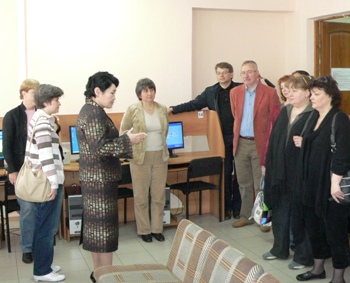 Irina Balkhayeva, Federation Council committee adviser, tells forum participants about the work of the National Library of the Republic of Buryatia. Centre, Tatyana Manilova, Deputy Director of the Division of Cultural Heritage and Pictorial Arts, Head of the Department of Libraries and Archives of the Ministry of Culture of the Russian Federation
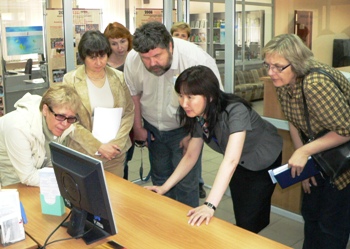 Forum participants examining databases of the National Library of the Republic of Buryatia
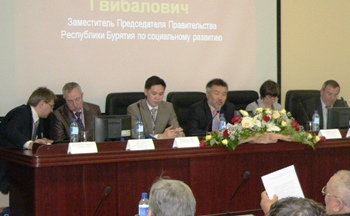 The Electronic Library section presidium. From left, Marius Lukosiunas, Adviser for Communication and Information of the Moscow Cluster UNESCO Office; Evgeny Kuzmin, Chair of the Russian Committee of the UNESCO Information for All Programme; Timur Tsybikov, Minister of Culture of Buryatia; Bair Balzhirov, Deputy Prime Minister of Buryatia for Social Development; Tatyana Manilova, Deputy Director of the Division of Cultural Heritage and Pictorial Arts, Head of the Department of Libraries and Archives of the Ministry of Culture of the Russian Federation; and Yuri Pimoshenko, head of the information support group of the Presidential Property Management Department of the Russian Federation
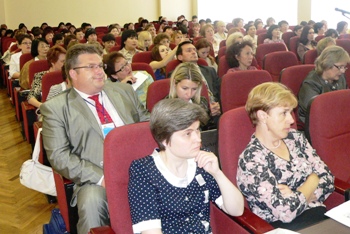 Participants of the Electronic Library section
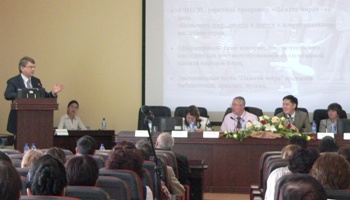 Marius Lukosiunas, Adviser for Communication and Information of the Moscow UNESCO Office, has the floor
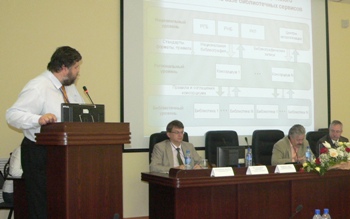 Alexander Plemnek, ARBICON Managing Director, speaking
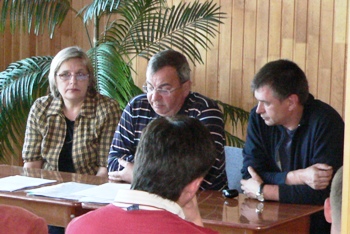 Roundtable “The Boris Yeltsin Presidential Library: The Work of Branches in the Regions of the Russian Federation”. Presidium: Elena Smolina, Academic Secretary of the Boris Yeltsin Presidential Library; Yuri Pimoshenko, head of the information support group of the Presidential Property Management Department of the Russian Federation; and Mikhail Troitsky, First Deputy Manager of the Computer Centre of the Presidential Property Management Department of the Russian Federation
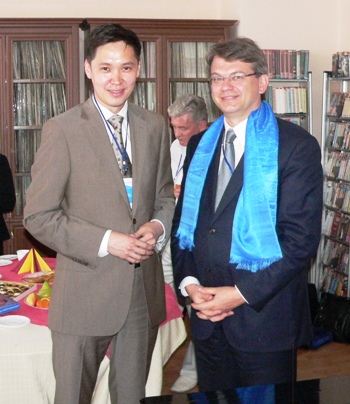 Timur Tsybikov, Minister of Culture of Buryatia, and Marius Lukosiunas, Adviser for Communication and Information of the Moscow UNESCO Office
|
|||
© 2006 Russian Committee of UNESCO "Information for All" program |
|
|||||